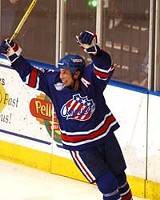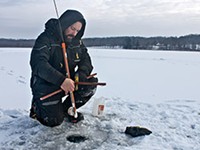[
{
"name": "500x250 Ad",
"insertPoint": "5",
"component": "15667920",
"parentWrapperClass": "",
"requiredCountToDisplay": "1"
}
]
The US Labor Department might soon have to create a public service announcement for pro sports. It would warn of the disastrous economic impact that could occur when teams purposely play a procrastinating, chew-up-the-clock style of offense.
The ad would be based on the 1980s drug-prevention PSA of a father confronting his pot-smoking son. My version has Cowboys coach Bill Parcells, a proponent of clock-control offenses, confronting a talking US map.
"What's this?" Parcells asks, pointing to a report that US productivity declined during fourth-quarter 2003.
"That's a report that US productivity declined during fourth-quarter 2003," the map answers.
"I know what it is. But why? Who taught you how to do this?"
"You did! I learned it by watching you!" the map abruptly declares.
The camera cuts to Parcells, stunned and teary-eyed. A voiceover says, "Coaches who waste time, have countries who waste time."
It's no secret that pro athletes and coaches have served as our role models for years. Sadly, we've become a time-wasting, drug-addicted, domestic-assaulting, gun-brandishing, person-disrespecting society that rips bra cups off women during Super Bowl halftime shows.
I'm with President Bush. If we just get rid of steroids in sports and set good examples for children who keep bugging mom for some tetrahydrogestrinone, maybe we wouldn't have brawls during St. John Fisher-Nazareth College men's basketball games.
In the meantime, we need to become role models for pro athletes and coaches, not have it the other way around. Because that clearly doesn't work. The first thing we must do is eliminate this trend of clock-chewing offenses content with stalling until the time is right to score. That's one reason why scoring is down in many pro sports from a decade ago or less.
The Amerks are fielding one of the lowest-scoring teams in the franchise's history. They play the Buffalo Sabres' boring defensive style, mostly a leftover from the Dominik Hasek era, when he was holding NHL opponents to three or fewer goals each night in the '90s. The Sabres proved that goaltending could make an elite team, with Hasek leading them to the Stanley Cup Finals in 1999. Buffalo figured, "Who needs scoring?"
The answer, of course, is that hockey does. When a sport consistently gets low TV ratings, scoring is needed.
Last season, the Buffalo Bills were supposed to play a physical, ball-control, chew-up-the-clock offense. They supposedly brought Sam Gash back to do that, and many fans got excited that one of the best-blocking fullbacks ever would be playing for them again.
But why is that exciting? Physical, ball-control offenses strike me as dreadfully dull. Obviously, they struck Kevin Gilbride the same way.
Average scoring per team in the American Hockey League, National Hockey League, and National Basketball Association has declined from 10 years ago.
It has also declined in Major League Soccer since its inception in 1996, even though Major League Soccer should do just about anything to increase scoring.
I once wrote FIFA, soccer's international governing body, suggesting it dismantle MLS because of lifeless play. I figured there was such diluted talent, there just wasn't enough skill for teams to score as in Europe. So MLS teams just played defense because it was the only thing they could play.
I wanted to place four US teams (New York, Miami, Dallas, and Los Angeles) in the Mexican Premier Division so Americans could see a higher-quality product. A FIFA official wrote back and said my proposal would be given attention at the proper levels, which a former colleague determined to be the janitor who takes out the trash.
Still, the news is not all bad for soccer. There was a scoring increase in the Rhinos' A-League from eight years ago, but it was just two percent, meaning that instead of taking an hour and a half for each team to score 1.39 goals, it now takes just an hour and 29 minutes.
I suspect NBA scoring is down partly because players no longer wear the hot pants they used to back in the '70s and '80s, which cuts down on their aerodynamics.
Ultimately, low scoring is the byproduct of pro sports' win-at-all-cost mentality. Many people might interpret that as winning dirty. But today it means winning any way a team can, usually by wasting time and playing defense. Pro coaches have decided that's the easiest and fastest way to develop a winning program, and the best way for them to keep working.
Forget a creative attack. That would take more effort than just playing defense. I imagine a hockey game one day where the referee drops the puck and all the players skate to their respective goals and just stand in front of them for 60 minutes.
Instead of trying to maximize winning by attempting to score, teams minimize losing by attempting to limit the opponent's scoring opportunities, while being ready to capitalize on mistakes in order to score themselves. They hope to exploit a few blunders and then run out the clock. That doesn't seem to fit the spirit of sport. Why play not to play?
Perhaps more fitting, why watch? Things will change if we don't.
Latest in Sports
More by Mike Doser
-
They’re football players
Aug 10, 2005 -
Are sports dying?
Jul 27, 2005 -
Are sports dying?
Jul 27, 2005 - More »





